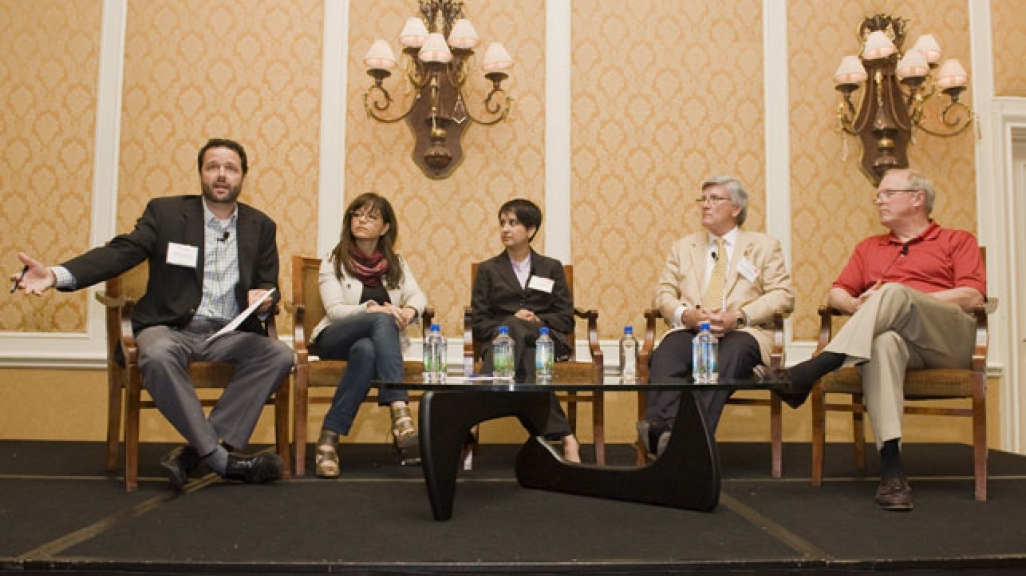Summary: The New “It” City - How Immigrants Contribute to Nashville's Growing Success
Summary: The New “It” City - How Immigrants Contribute to Nashville's Growing Success
Tennessee’s capital is making strides to integrate immigrants, who make up nearly 9 percent of the city’s population.
Welcoming Remarks:
- Susan Segal, President and CEO, Americas Society/Council of the Americas
Keynote Speakers:
- Karl Dean, Mayor, Metropolitan Government of Nashville and Davidson County
- Jim Cooper, Member of Congress, U.S. House of Representatives
Panelists:
- Nisha Agarwal, Commissioner, New York City Mayor’s Office of Immigrant Affairs
- Todd Gardenhire, State Senator, Tennessee General Assembly
- Ralph Schulz, President & CEO, Nashville Area Chamber of Commerce
- Renata Soto, Co-founder and Executive Director, Conexión Americas
- Stephen Fotopulos, Former Executive Director, Tennessee Immigrant and Refugee Rights Coalition (Moderator)
Summary
On May 23, AS/COA held a public luncheon in Nashville which brought together government, private sector, and community leaders from the city and across the country. Speakers discussed the evolution of immigration policy in Nashville and the role of immigrants in making the city an economically competitive and culturally vibrant hub. Participants contextualized Nashville’s progress within the ongoing push for new legislation in Tennessee, immigrant integration initiatives in other cities, and national immigration policy. The luncheon was part of AS/COA’s Immigration and Integration Initiative, which promotes immigrant integration and dialogue in gateway cities across the country.
The Past, Present, and Future of Immigration in Nashville
After seeing a rapid increase of immigrants in recent years, immigrants make up around 8.5 percent of the Nashville metropolitan area’s total population. Following anti-immigrant sentiment in the mid-2000s, the city has become a nationally lauded example of a welcoming city. “I think immigration has been great for our city; it has done a lot to make our city more exciting and more economically viable,” said Mayor Karl Dean in his keynote remarks. The Nashville Area Chamber of Commerce’s Ralph Schulz noted that “multi-cultural communities draw people to the community,” explaining that more people attract jobs and that to compete in the global marketplace, a city has to be inclusive.
Amid demographic change, Nashville reached a crossroads in 2009 when an English-only charter amendment was proposed which would have made English the official city and county language. It also would have jeopardized new immigrants’ integration into the community by requiring all official business to be conducted in English, prohibiting immigrants from receiving services in any other language. Through a coalition of community organizations, faith leaders, and local businesses, the city’s residents organized to defeat the bill. Dean described this effort as “a good example of what can happen when community members stand up together and say ‘we will welcome immigrants and we will not tolerate discrimination.’” Steven Fotopolus, the former executive director of the Tennessee Immigrant and Refugee Rights Coalition, said: “Immigrants add value; they bring value into our work force, to our tax base, to our small business sector.”
The panelists pointed to some of the welcoming programs created in the wake of the defeated English-only bill, such as the MyCity Academy, a free seven-month training program started in 2012 that helps new Nashvillians to understand how city government works. Casa Azafrán, a community space that provides access to health care, legal services, child care, English classes, and other services serves as another example of a communal area for immigrants and native-born residents.
Speakers agreed that education is an avenue to continued integration and community growth. Conexión Americas’ Renata Soto singled out quality public education as an area that Nashville needs to expand its efforts. “I think that the challenge as we look ahead is that we have to understand fuller and participate at a higher level in conversations that affect immigrants but that is not just an immigrant issue,” she said.
The Push for Immigration Reform at the State Level
While immigration initiatives have developed quickly in Nashville, progress in the state has been much slower. Tennessee has a lower immigrant-to-native-born ratio than Nashville (one of 25 in the state versus one of 8 in Nashville). And in spite of welcoming efforts in Nashville, counties throughout state have adopted several exclusionary measures in the past several years, such as the U.S. Department of Homeland Security’s Secure Communities program, which checks the fingerprints of those under arrest against a database of undocumented immigrants.
However, both Lamar Alexander and Bob Corker—the two U.S. senators from Tennessee— voted for comprehensive immigration reform, making them two of 14 Republicans to vote for the bill. The number of anti-immigrant bills in the state has also been decreasing, from 40 introduced five years ago to five last year.
Republican State Senator Todd Gardenhire has been instrumental in changing the debate in the Tennessee state legislature to encourage inclusiveness. “In my opinion, the way to approach the issue [of immigration] is through education,” said Gardenhire, who sponsored a bill passed in March to grant in-state tuition to U.S.-born children of undocumented immigrants. After witnessing the hurdles for the children of undocumented immigrants in Chattanooga—primarily not being able to afford college—Gardenhire decided to focus his work on improving access to education. “We’re not giving those kids anything, so it’s not costing us anything… ironically it became a revenue producer,” said Gardenhire, describing how granting in-state-tuition to children of undocumented immigrants is estimated to increase the revenue of each university by $140,000. He also gave statistics from the Heritage Foundation that show that a child without a high school education costs tax payers $33,000 a year in benefits versus a college graduate, who statistically adds $15,000 a year to the treasury. “If you are campaigning against the deficit spending, this is the way to take care of it,” he noted.
The Need for National Immigration Reform
Congressman Jim Cooper (D-TN) called for heightened urgency within the U.S. House of Representatives to pass comprehensive immigration reform, stating that “we need a national solution to a national problem, and comprehensive immigration reform is the right way to do that.” He added his disappointment with the current, stagnated legislation. “[Immigration reform] is one of the missed opportunities of the last 30 years,” he lamented. In response, the New York City Mayor’s Office of Immigrant Affairs Commissioner Nisha Agarwal reminded the audience of the importance of city leadership in promoting inclusive cities. “Cities need to lead the way while we’re waiting for our state legislatures and our federal government to get their acts together,” she added.
Panelists discussed ways to institutionalize best practices for immigrant integration. Agarwal stressed the importance of having an office of immigrant affairs to ensure this work continues across administrations. Developing programs that include the entire community is key; she pointed to New York City’s new municipal ID program as an example of a document that can be used to access services for immigrant and native-born residents alike. “It’s really about creating a sense of common identity in New York City and a common access to all it has to offer,” she said. “I think that’s really the goal of what we’re trying to do in New York in this administration; permeate immigrant inclusion in a way that is part of the DNA of every agency of the city.”
Given that the voting demographic is changing in Tennessee and across the country, panelists expressed hope for legislative change. “What we’re dealing with is political inactivity in general,” said Fotopolus. But, he added, “the communities that we’re organizing… are engaging in the system to become citizens. They’re politicized; they’re not less likely to vote.” Cooper also expressed hope for immigration reform, saying that if the legislation passes, “more cities can be like Nashville, so that more of America can grow and be strong and give families better opportunities.”







